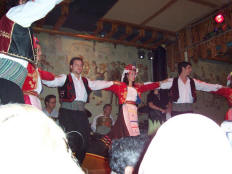Dinner in the Plaka
About 9:00 p.m. we walked into the Plaka, the oldest section of Athens, right up against the side of the Acropolis. We planned to have dinner at the Tavern of the Seven Brothers, which friends had recommended to us. As we walked into the Plaka, though, we found that there were no street lights and very little light coming from anywhere. It was a moonless night, and we could barely see where to walk in the narrow lanes, let alone find any street signs. The area was completely silent without another soul stirring.
Eventually we heard the click of a woman’s heels and groped our way toward the sound. We finally could make out the dim image of a woman. As we approached her, using the classical Greek pronunciation
I’d learned in high school, I asked her “Where is the Tavern of the Seven Brothers?" (Pou einai o Taverna ton Epta Adelphon?). She hesitated a full 30 seconds, then asked “Do you speak English?” When we said yes, she said, “ What was it you asked me?’ Although she was Greek, she just couldn’t understand
my pronunciation. I was crushed. But she not only gave us directions, but
also walked us to the tavern.
There were hardly any other customers in the tavern. A few musicians were playing modern Greek music (no bouzouki), and there was a fairly good female vocalist. The host spoke English and greeted us like long lost cousins. We must have looked a little leery about eating there because he invited us to examine the kitchen, insisting that we look in the refrigerator and in every pot and pan on the stove, too.

Tavern show (1983) |
[We returned to this same tavern 20 years later and found both the tavern and the Plaka totally changed. The once dark streets were so completely lined with lights (mostly gaudy neon) that there was little difference between night and day. The old tavern had kept its name, but it had become a chintzy auditorium. The main room had been greatly enlarged and filled with cheap, wooden folding chairs, packed tightly against each other in very close rows that left no leg room. There was a short performance of traditional Greek singing and dancing. Then the audience was quickly ushered out and replaced by a new one. We felt we were being hustled rather than entertained.]
Jane ordered a special fish filet, and
I had the “new-born” veal. The veal was served as a boneless mound of meat with a delicious sauce and artichokes. It was unbelievably tender. All the food was quite good.
I wanted to try the retsina wine that I had read about. Our host gave
me a little in a glass to taste. (It was the house wine.) Darrell swirled it in the glass and sniffed it before taking a sip. It tasted like turpentine, so we ordered a bottled wine instead.
I went through the same procedure again. Again the wine tasted like turpentine. Over the protestations of the host,
I insisted it was retsina. Finally, the host had Jane taste it, and she pronounced it fine, with no hint of the resin taste. In sniffing the retsina,
I had so filled my sinuses with the resin smell that everything tasted like turpentine for several minutes.
The ancient Greeks developed a taste for retsina back when wines were kept in barrels sealed with pine-pitch.
When they eventually stopped using those barrels, they thought the
wine tasted strange, so they began using resin in preparing the wine, just to duplicate the taste they were used to.
We each had a different type of dessert, and Darrell had to try a glass of ouzo, an anise-flavored liqueur. We left the taverna about 11:30 and found our way out of the Plaka through the dark streets. It was a short walk back to our hotel where we retired for the night. We had been up more than 21 hours, since 2:15 a.m. It had been a long day.
Page 1 2 3 4 5
Home
Copyright 2000-2024 DarrellPeck.com All rights
reserved.
|
|